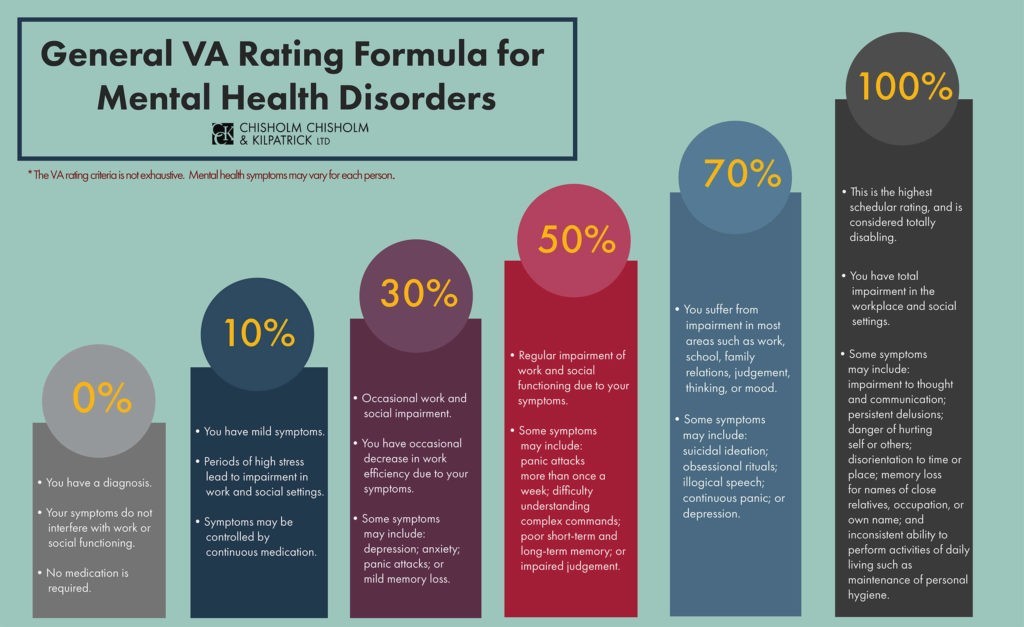VA Disability Rating for Adjustment Disorder

CCK Law: Our Vital Role in Veterans Law
What is Adjustment Disorder?
Adjustment disorder is characterized as a short-term condition that occurs when a person has great difficulty coping with, or adjusting to, a particular source of stress, such as a major life change, loss, or event. Since people with adjustment disorder often have some of the symptoms of depression, such as tearfulness, feelings of hopelessness, and loss of interest in activities, the condition is sometimes informally referred to as “situational depression.” However, unlike major depressive disorder, adjustment disorder does not involve as many of the physical and emotional symptoms of clinical depression (e.g., changes in sleep, appetite, and energy) or high levels of severity (e.g., suicidal ideation). The types of stress that can trigger this condition include the following:
- Ending of a relationship or marriage
- Losing of changing job
- Death of a loved one
- Developing a serious illness
- Being a victim of a crime
- Having an accident
- Undergoing a major life change
- Living through trauma
Adjustment disorder is marked by emotional and/or behavioral symptoms (e.g., sadness, frequent crying, anxiety, withdrawal or isolation) that generally begin within three months of the stressful event and rarely last for longer than six months after the event has ended. Importantly, the reaction to the event must be greater than what is typical or expected for the situation or event in order to be categorized as this disorder. Furthermore, the symptoms will cause problems with a person’s ability to function on a daily basis.
It is important to note that adjustment disorder is not the same as post-traumatic stress disorder (PTSD). PTSD occurs as a reaction to a life-threatening event that takes place at least one month after the traumatic event, and its symptoms tend to last longer in duration.
Adjustment Disorder in Service Members and Veterans
Adjustment disorder is one of the most prevalent mental health conditions in both military and civilian populations. Moreover, it is the most commonly diagnosed type of mental health condition among active duty service members. In 2017, 7.1 percent of active duty service members were diagnosed with an adjustment disorder. This percentage is very high compared to 2.1 percent of service members diagnosed with PTSD, 4.2 percent diagnosed with a depressive disorder, and 4.8 percent diagnosed with an anxiety disorder. However, despite the high prevalence of the condition, it is one of the least researched and talked about mental health conditions. Far more research and health care has been dedicated to PTSD and depression. This may be due to the fact that adjustment disorder is considered to be a more benign type of mental health condition as compared to PTSD and depression. This disorder is associated with an expectation of a good outcome soon after the stressor subsides whereas PTSD is usually more chronic.
VA Service Connection for Adjustment Disorder
In order to receive VA disability benefits for adjustment disorder, veterans must first establish service connection. Doing so involves satisfying the following three elements:
- a current diagnosis of adjustment disorder
- evidence of an in-service event, injury, or illness
- a medical nexus linking the in-service occurrence to the current, diagnosed adjustment condition
For evidence of an in-service occurrence, VA will often look for in-service treatment records. If adjustment disorder symptoms emerged while a veteran was in the military and he or she sought treatment with a mental health counselor, it should be documented in-service records. If veterans do not have service treatment records, it may be helpful to provide lay statements from friends or family outlining the onset of symptoms and the progression of the veteran’s condition.
From there, veterans will likely need to undergo a Compensation & Pension (C&P) examination to obtain a positive nexus opinion. Here, veterans are looking for the examiner to find that their condition is “at least as likely as not” due to their time in service.
How VA Rates Adjustment Disorder
If service connection is established, VA will assign a disability rating based on severity. VA rates adjustment disorder using the General Rating Formula for Mental Disorders under 38 CFR § 4.130. Veterans can be assigned a 0, 10, 30, 50, 70, or 100 percent rating. These ratings are based on the level of social and occupational impairment a condition presents. Importantly, veterans are not required to meet all of the criteria listed in a rating level to qualify for that rating.
Can VA Reduce Veterans’ Disability Ratings?
As indicated above, adjustment disorder by definition is expected to improve over time. If this is the case, it is possible that VA will re-evaluate the veteran’s condition and issue a new rating percentage. However, there are a number of things VA must do when reducing ratings under any circumstances.
Disagree with a VA Decision? Contact CCK Law
Chisholm Chisholm & Kilpatrick LTD is the nation’s leading veterans law firm. Since 1999, CCK Law has grown to include more VA-accredited advocates and attorneys than any other firm and represent nearly 30,000 veterans or their dependents before Veterans Affairs or the U.S. Court of Appeals for Veterans Claims. CCK Law attorneys have argued many of the most precedent-setting cases in veterans law, playing an indispensable role in clarifying and protecting the benefits created by Congress for millions of veterans. We have published over 2,500 webpages and 800 videos about the law, including free calculators to build a VA claim, calculate a combined VA rating or backpay, and more.
We offer free case evaluations to determine if we can assist with your case. Contact us today.
About the Author
Share this Post

